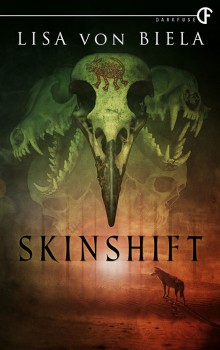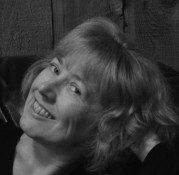Skinshift by Lisa von Biela
 By Amy Lignor
By Amy Lignor
When it comes to the evil side of technology, there are some literary artists who know the issue inside and out. Author Lisa von Biela is one such writer. From her beginnings in short story work to her novels, this is a woman who knows the IT industry, among other realms, and produces that gritty, dark fiction (horror, criminal, supernatural, and more) that puts the ultimate thrills and chills into fans.
Von Biela was kind enough to spend some time explore her latest novel SKINSHIFT and her background.
Working in the IT field for twenty-five years, then graduating magna cum laude from the University of Minnesota Law School, is quite a varied résumé. Where and when did it come about that writing fiction was something you really wished to add to your life?
I do have a fairly checkered past, don’t I? Add to that my pre-vet undergrad at UCLA, which helps with the medical aspects of my books. I have to say, I think I’ve always wanted to write, but it took some time before I figured out how to go about it. I recall spending a summer when I was a teenager creating stories on a typewriter. No technique or outlining, just typing as it came to me. Around the late eighties, I got a medium-sized spiral notebook and started inventorying possible plots, and trying to write. Then I took another run at it in the late nineties. That time, I consulted Writer’s Digest and some books on the topic, and developed an approach. My plan was to start with short stories to learn the craft and get published. After a while, I felt ready to write my first novel-length work. And when I sold The Genesis Code to DarkFuse that clinched it. I’ve been writing like mad ever since.
The pre-vet helps with the medical aspects. How about the legal background? Is this something you rely on or do you tend to stay focused on technology?
I actually wrote The Genesis Code before I started law school, when I was still in IT. The topic came quite naturally but it took two years to finish because I had to learn how to handle a work of that length. Despite being a lawyer, I tend to gravitate toward writing medical thrillers, usually including a lawyer character. That said, perhaps because I’m a lawyer, I like to explore ethical issues in my novels. My current work-in-progress changes things up a bit, being a medical, technical, and legal thriller, with a young female attorney protagonist. Being a lawyer involves being able to think and write in a disciplined way which carries over to my fiction—and having to write fiction efficiently in the time I have available has made me a fairly fast legal writer in return. Therefore, each side of my life benefits!
You have written a plethora of short stories. What do you like about the short versus tackling the novel, other than time allotment?
The short form helped me learn the craft without having to wrangle a huge number of words, and I highly recommend that approach to new writers. However, between practicing law full-time and writing novels, I’ve had less time for shorts these days. I do, however, prefer a shorter format when delving into experimental work. It frees me to take more risks. That’s why I’ve gravitated toward med/tech thrillers for my novel-length works, and more horror/experimental for my novellas. For me, the shorter length works better for that sort of story.
Are there always “drafts” on your computer of the next work?
Yes, I absolutely hoard ideas for future use. Whenever I think of a premise, idea, or seed of any kind, I capture it right away. Then, when I sit down to write my next book or story, I can peruse the list and pick whichever one calls to me most at that point. My little stockpile is very important to me!
Is there a specific mentor you feel helped guide you in becoming an author?
Back when I began my serious foray into short stories, I submitted to various small press markets, one of which was The Edge edited by Greg F. Gifune. Unlike any other editor who sent me rejections in those days, he took the time (by snail mail, no less) to say why he was rejecting the story and offer excellent suggestions on how I could improve. After several rounds of rejection and rewrites, he accepted the first story of mine that ever saw publication (“Vacancy”). He’s always believed in my potential and encouraged me over the years. When he posted a call for novels on behalf of DarkFuse in the fall of 2012, I submitted The Genesis Code. It was beyond surreal when he called to tell me they wanted to buy my novel, ten years after he’d accepted my first story.
Is there another genre that you have not tried that you wish to one day attempt?
I would really love to write an epic post-apocalyptic novel. Some sort of cross between the work of Margaret Atwood and Stephen King (I loved The Stand so much I re-read the massive unabridged version).
Your new book, SKINSHIFT, is coming out this month. Can you tell readers what they have to look forward to?
SKINSHIFT has an odd history. My boyfriend and I went camping in the middle of nowhere in Nevada a couple of summers ago. We found a lone campsite with the basics: table, fire ring, outhouse, and a good spot for the tent. No one else was around. Nothing…except the skulls. There were skulls on the trees; there was one on the table. Antelope, cow, horse, coyote, and more. Quite the assortment but, thankfully, no human. I declared at the time I had to write something inspired by the skulls, and that’s SKINSHIFT. But how to incorporate skulls into the plot took some thinking.
The rather nasty protagonist, Dominic Donato, is beaten and left for dead in the Mojave Desert by his criminal buddies after a heist gone wrong. The skulls help him discover some very special powers that enable him to not only survive, but to get some wicked revenge. SKINSHIFT is a novella that combines crime, horror, and the supernatural.
Is there a specific goal set in your mind in regards to what you would like the reader to go away with after they’re done with one of your works?
My novellas address different subject matter but are so far, generally, about the evil men do. The novels, however, are quite different and I do have goals for them. So much has changed during my lifetime. Personal computers didn’t exist when I was a kid. The days before email, voicemail, let alone the Internet, were the days I grew up in. So I’ve been able to observe all the good and the bad that came from that. We have such fabulous technology that can do tremendous things now, but it also has the power to do great harm on a massive scale. Which is what my novels are mainly about: the dark side of technology that, on the other side, is or could be quite beneficial. I’d like my readers to think about these things…to enjoy technology, but to think about some of the ethical implications and be cautious of the harm it can (and has) done when misused. For example, The Janus Legacy explored the ethics of designer transplant organs and human cloning for the sake of organ harvesting. Goodness knows that everything from violent disease and health issues to computer-controlled drones—you name it, have become reality. So the questions remain: Asking how far can we go is intriguing, but we also need to ask how far should we go.
Do you have your own ideas as to how things may occur in this world, perhaps even a theory on the “end” if computers are involved?
You just gave me a great plot idea: a post-apocalyptic novel where the apocalypse is brought on somehow by computers.
Seriously, I fear we’ll keep making scientific and technological advances without establishing a social and ethical framework to manage our creations. There’s so much potential for genuinely useful technology to be misused in terrible ways. And, disturbingly, my fiction seems to keep coming true. Right now DARPA is experimenting with brain-chip technology similar to that seen in The Genesis Code, to try to cure PTSD in soldiers by implanting different memories. Even some of the tech I created in Blockbuster is starting to show up, though mine is still better. (LOL.) What could possibly go wrong?
If there was one author (past or present) that you could sit down and have lunch with, who would it be and why?
Rod Serling! “The Twilight Zone” has been and continues to be a huge influence for me. I love the way he wrote episodes that worked on so many levels. His stories always entertained and explored some greater human truth or issue, and I strive for that in my work. And how on earth did he crank out show after show on the schedule he had to fulfill? Maybe he sold his soul to the devil. I’d like to ask him about that. As an aside, I learned recently that I lived only about three blocks away from Ray Bradbury when I was a teenager. I used to take long walks through the neighborhood and almost surely passed by his house—and I had no clue. I wonder what would have happened if I’d knocked on his door?
___
With the creative mind and amazing works this writer has offered, I would venture a guess that if the young Lisa von Biela had knocked, Bradbury would have opened his door and been intrigued by what his visitor had to say.
*****
 Lisa von Biela worked in Information Technology for 25 years, then dropped out to attend the University of Minnesota Law School, graduating magna cum laude in 2009. She now practices law in Seattle, Washington.
Lisa von Biela worked in Information Technology for 25 years, then dropped out to attend the University of Minnesota Law School, graduating magna cum laude in 2009. She now practices law in Seattle, Washington.
Lisa began writing short, dark fiction just after the turn of the century. Her first publication appeared in The Edge in 2002. She went on to publish a number of short works in various small press venues, including Gothic.net, Twilight Times, Dark Animus, AfterburnSF, and more. She is the author of the novels THE GENESIS CODE, THE JANUS LEGACY, and BLOCKBUSTER, as well as the novella ASH AND BONE.
To learn more about Lisa, please visit her website.
- Friend of the Devil by Mark Spivak - July 31, 2016
- The Image of Her by Lorna Peel - June 30, 2016
- Riot Load by Bryon Quertermous - May 31, 2016
